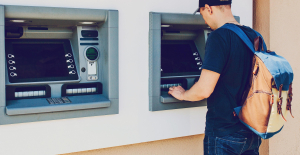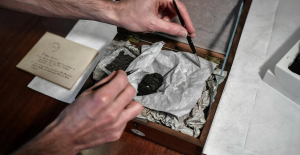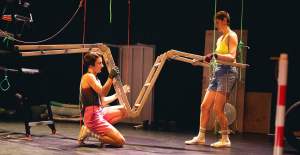In recent days, strong heat has hit the country. Such heat waves put the body to the test, with significant impacts on health. Seniors, people who work outdoors or are exposed to heat sources (especially in catering) are the first to be affected, not to mention those who suffer from heart failure, neurodegenerative diseases or diabetes. For good reason, intense heat can disrupt the regulation of body temperature, while certain medications tend to increase these effects. However, no one is spared. And even if the end of the summer is approaching, the new episode of heat which is announced promises to be the most intense of the summer.
” READ ALSO – What is the heat wave plan?
Don't wait until you feel thirsty, as this is already a sign that your body is becoming dehydrated. When temperatures soar, we lose more water through perspiration. To compensate for these losses, it is recommended to drink an average of 1.5 liters of water per day. Drinks rich in sugar and caffeine should be consumed in moderation because of their diuretic effects which increase the production of urine, therefore water loss. This also applies to alcohol, tea and coffee which are not good allies to face the heat. Finally, be sure to hydrate your infant well because severe dehydration can lead to the formation of bruises on the head.
By sweating we lose essential minerals. A suitable diet is therefore crucial to compensate. We will favor fruits, vegetables because of their high mineral content without forgetting the protein intake found in meat, fish, eggs and legumes (chickpeas, beans, etc.). Avoid large meals as they can raise your body temperature during digestion and increase feelings of fatigue. Cooking food is also an avoidable heat source. Hence the interest of opting for cold dishes, such as a salad.
In the event of a heat wave, intense physical activity should be avoided between 11 a.m. and 5 p.m. Prefer moderate sessions in the morning or evening, even if it means dividing a large sports session into two smaller ones in these time slots. Such recommendations also apply for walks and any recreational activity (beach sports, playgrounds, etc.). It should also be noted that pets appreciate shaded walks in the cooler hours.
During the day, close shutters and curtains to prevent heat from entering unless the room is not exposed to the sun, in which case the opening of the windows allows drafts. Instead of running air conditioning that is energy-intensive and partly responsible for global warming, fans are a good compromise! You can place a damp towel in front of your fan so that the brewed air becomes cooler or opt for a fan with an integrated mist maker. If possible, consider investing in insulation work in your home. For low incomes, state grants are designed to help you with these procedures.
” READ ALSO – The most effective and cheapest equipment to protect your home from the heat wave
In case of high heat, certain medications such as diuretics, neuroleptics or antidepressants can cause hyperthermia (increase in body temperature) and increase the risk of dehydration. But this is also the case with aspirin, for example. As for paracetamol, it is not effective in treating headaches in hot weather. If you are under treatment, consult your doctor who can assess the risks and adapt your treatment accordingly. However, above all, do not stop your treatment without medical advice and also remember to follow the advice on storing your medication (listed on the leaflet).
Here is a summary table of the drugs likely to aggravate the risk of dehydration according to the ANSM:
To facilitate interventions in the event of extreme heat, the municipalities set up heat wave registers which list people wishing to get help. These registers are intended for people over 65, people over 60 unable to work and/or receiving the personalized autonomy allowance, as well as people with disabilities. Registration is free. To do this, simply fill out a form to send to the Communal Center for Social Action in your city (CCAS), or contact your center by telephone. From then on, targeted measures will be put in place: medical interventions, home help (shopping, cleaning, etc.), travel and access to essential resources (water, food). Local authorities will contact you regularly to check if you need assistance.
Elderly people, people with chronic illnesses and people with reduced mobility are more susceptible to the effects of extreme heat, so be sure to check in regularly with your vulnerable loved ones, offer your help with transportation or meal preparation, and make sure you make sure they stay well hydrated.

 B:SM will break its investment record this year with 62 million euros
B:SM will break its investment record this year with 62 million euros War in Ukraine: when kyiv attacks Russia with inflatable balloons loaded with explosives
War in Ukraine: when kyiv attacks Russia with inflatable balloons loaded with explosives United States: divided on the question of presidential immunity, the Supreme Court offers respite to Trump
United States: divided on the question of presidential immunity, the Supreme Court offers respite to Trump Maurizio Molinari: “the Scurati affair, a European injury”
Maurizio Molinari: “the Scurati affair, a European injury” Irritable bowel syndrome: the effectiveness of low-carbohydrate diets is confirmed
Irritable bowel syndrome: the effectiveness of low-carbohydrate diets is confirmed Beware of the three main sources of poisoning in children
Beware of the three main sources of poisoning in children First three cases of “native” cholera confirmed in Mayotte
First three cases of “native” cholera confirmed in Mayotte Meningitis: compulsory vaccination for babies will be extended in 2025
Meningitis: compulsory vaccination for babies will be extended in 2025 When traveling abroad, money is a source of stress for seven out of ten French people
When traveling abroad, money is a source of stress for seven out of ten French people Elon Musk arrives in China to negotiate data transfer and deployment of Tesla autopilot
Elon Musk arrives in China to negotiate data transfer and deployment of Tesla autopilot Patrick Pouyanné, CEO of TotalEnergies, is very reserved about the rapid growth of green hydrogen
Patrick Pouyanné, CEO of TotalEnergies, is very reserved about the rapid growth of green hydrogen In the United States, a Boeing 767 loses its emergency slide shortly after takeoff
In the United States, a Boeing 767 loses its emergency slide shortly after takeoff A charred papyrus from Herculaneum reveals its secrets about Plato
A charred papyrus from Herculaneum reveals its secrets about Plato The watch of the richest passenger on the Titanic sold for 1.175 million pounds at auction
The watch of the richest passenger on the Titanic sold for 1.175 million pounds at auction Youn Sun Nah: jazz with nuance and delicacy
Youn Sun Nah: jazz with nuance and delicacy Paris Globe, a new international theater festival
Paris Globe, a new international theater festival Skoda Kodiaq 2024: a 'beast' plug-in hybrid SUV
Skoda Kodiaq 2024: a 'beast' plug-in hybrid SUV Tesla launches a new Model Y with 600 km of autonomy at a "more accessible price"
Tesla launches a new Model Y with 600 km of autonomy at a "more accessible price" The 10 best-selling cars in March 2024 in Spain: sales fall due to Easter
The 10 best-selling cars in March 2024 in Spain: sales fall due to Easter A private jet company buys more than 100 flying cars
A private jet company buys more than 100 flying cars This is how housing prices have changed in Spain in the last decade
This is how housing prices have changed in Spain in the last decade The home mortgage firm drops 10% in January and interest soars to 3.46%
The home mortgage firm drops 10% in January and interest soars to 3.46% The jewel of the Rocío de Nagüeles urbanization: a dream villa in Marbella
The jewel of the Rocío de Nagüeles urbanization: a dream villa in Marbella Rental prices grow by 7.3% in February: where does it go up and where does it go down?
Rental prices grow by 7.3% in February: where does it go up and where does it go down? Even on a mission for NATO, the Charles-de-Gaulle remains under French control, Lecornu responds to Mélenchon
Even on a mission for NATO, the Charles-de-Gaulle remains under French control, Lecornu responds to Mélenchon “Deadly Europe”, “economic decline”, immigration… What to remember from Emmanuel Macron’s speech at the Sorbonne
“Deadly Europe”, “economic decline”, immigration… What to remember from Emmanuel Macron’s speech at the Sorbonne Sale of Biogaran: The Republicans write to Emmanuel Macron
Sale of Biogaran: The Republicans write to Emmanuel Macron Europeans: “All those who claim that we don’t need Europe are liars”, criticizes Bayrou
Europeans: “All those who claim that we don’t need Europe are liars”, criticizes Bayrou These French cities that will boycott the World Cup in Qatar
These French cities that will boycott the World Cup in Qatar MLS: new double for Messi who offers victory to Miami
MLS: new double for Messi who offers victory to Miami PSG-Le Havre: Ramos on his way, Kolo Muani at the bottom of the hole… Favorites and scratches
PSG-Le Havre: Ramos on his way, Kolo Muani at the bottom of the hole… Favorites and scratches Football: Vasco da Gama separates from its Argentinian coach Ramon Diaz
Football: Vasco da Gama separates from its Argentinian coach Ramon Diaz F1: for the French, Ayrton Senna is the 2nd best driver in history ahead of Prost
F1: for the French, Ayrton Senna is the 2nd best driver in history ahead of Prost

















